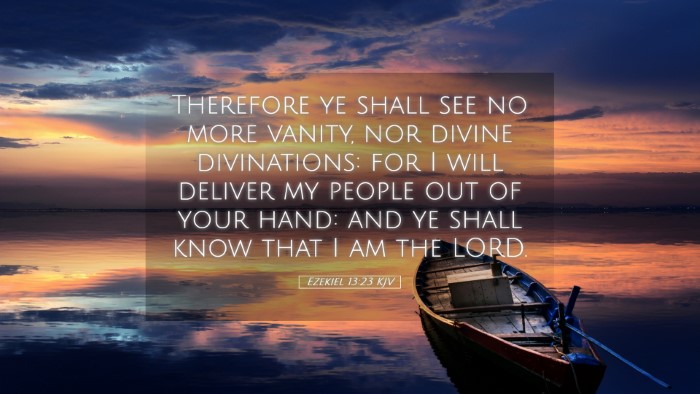Ezekiel 13:23 - Commentary and Insights
Verse: "Therefore ye shall see no more vanity, nor divine divinations: for I will deliver my people out of your hand: and ye shall know that I am the LORD."
Contextual Overview
Ezekiel was a prophet during the Babylonian exile, addressing the people of Israel and especially their leadership. In chapter 13, he confronts the false prophets who mislead the people with deceptive messages and false hopes. Ezekiel's message serves as both a warning and a promise of restoration that comes through the sovereign action of God.
The Role of False Prophets
Matthew Henry's Commentary: Matthew Henry emphasizes the destructive impact of false prophecy, noting that they have caused great distress among the people of Israel. Instead of guiding the people towards repentance and faithfulness, these prophets provided assurances that the dangers were nonexistent. The verse signifies a divine judgment on such deceitful practices.
Albert Barnes' Notes: Barnes points out that these false prophets promised peace when there was no peace, leading the people into complacency. They used divination and other occult practices to establish their credibility. This passage indicates that God will put an end to their deceptive ministry and restore clarity and truth to His people.
Adam Clarke's Commentary: Clarke elaborates on the nature of these false prophecies, stating that they are grounded in human imagination rather than divine revelation. He signifies that their end is inevitable, as God will reveal His sovereignty over both Israel and the false prophets who mislead them.
The Divine Assurance
This verse is profound in its assurance that God is not indifferent to the plight of His people. He directly states that He will deliver them from the hands of the false prophets:
- Deliverance: The promise of deliverance is central in this verse. God acts decisively to liberate His people from the grips of falsehood.
- Knowledge of the Lord: The culmination of deliverance is a deeper understanding of God's character. The phrase "ye shall know that I am the LORD" emphasizes relational knowledge rather than mere intellectual assent.
Theological Implications
This text carries significant theological insights that resonate through the ages:
- God's Sovereignty: The assurance of divine deliverance underscores God's overarching authority and control over history, a central theme throughout the Scriptures.
- The Nature of Prophecy: Real prophecy aligns with God's truth and seeks to lead people toward righteousness, contrasting sharply with the fictitious assurances of the false prophets.
- Restoration Theme: This verse highlights that despite judgment and discipline, God's intention is always restoration and reconciliation.
Application for Today
The themes present in Ezekiel 13:23 are highly relevant for contemporary contexts:
- Discernment: Just as Ezekiel called his contemporaries to discern the true from the false, modern believers are urged to seek God’s truth and not be swayed by popular opinion or false assurances.
- Hope in Deliverance: This verse reminds the faithful that no matter how dire the situation, God is able and willing to deliver His people, fostering hope in times of trouble.
- True Knowledge of God: Emphasizing the importance of knowing God, believers are encouraged to deepen their relationship with Him, striving for authentic faith rooted in Scripture.
Conclusion
Ezekiel 13:23 stands as a powerful reminder of God's commitment to His people amidst the tumult of falsehood. Through the insights of Matthew Henry, Albert Barnes, and Adam Clarke, we see a profound interplay between divine judgment and the promise of restoration. Pastors and theologians are encouraged to convey the urgency of seeking true prophecy and the necessity of knowing and trusting in the Lord for deliverance and hope.


